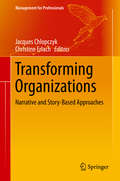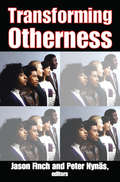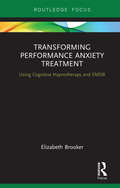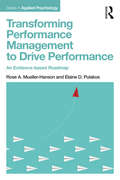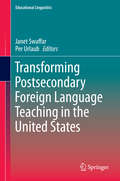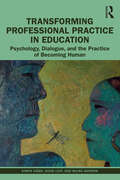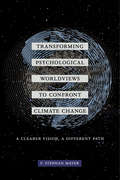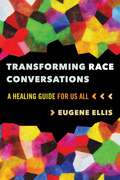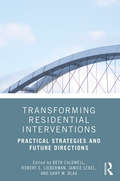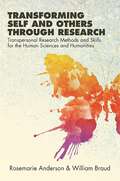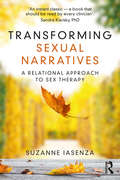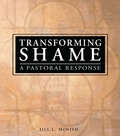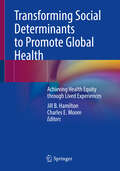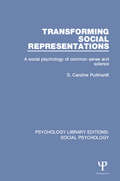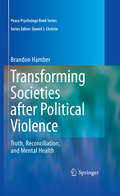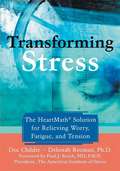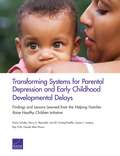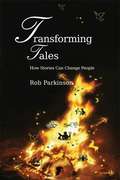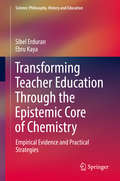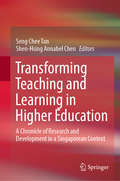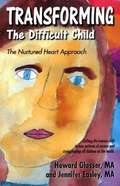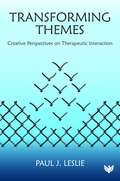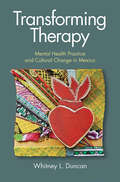- Table View
- List View
Transforming Negative Self-Talk: Practical, Effective Exercises
by Steve AndreasA toolkit of practical strategies for managing intrusive, negative ?self-talk and how you respond to it. Hearing a judgmental or disapproving internal narrative is a very common mental health complaint, and not always a sign of schizophrenia or another serious diagnosis. Persistent inner chatter and rumination can lead to depression, anxiety, phobias, trauma, obsessive-compulsive thoughts, and more. In this unique collection of practical, take-charge strategies, the author reveals how self-critical voices can actually be altered and used to your own advantage. Rather than changing the words themselves, Steve Andreas's approach is to change how the words are spoken through specific, easy-to-implement techniques, such as changing the location of the voice; its distance from you; its tempo, tone, or volume; and much more. Unlike most therapies that advocate talking back or ignoring it, this guide offers exercises for viewing our self-talk as a useful and productive indicator of our emotions, and shows us how to take control of them in a more meaningful way.
Transforming Organizations: Narrative and Story-Based Approaches (Management for Professionals)
by Jacques Chlopczyk Christine ErlachAchieving true change and innovation depends on our ability to re-imagine and re-author the futures we want our organizations to have – and to open new perspectives and new ways of thinking, being and doing in the process. Narrative approaches and storytelling are powerful tools that can help us create a new future for branding and marketing, change, leadership, organizational learning and development. Gathering contributions by scholars and practitioners from various disciplines, this book provides a unique overview of an emerging field of practice in organizations and communities. Rooted in a narrative conceptual framework, the respective papers describe a broad range of trans-disciplinary applications, tools and methods for effectively working with stories.
Transforming Otherness
by Jason Finch Peter NynäsToday, people in different situations and contexts face intercultural challenges. These are a result of increasing mobility. Sometimes such challenges are brought about by crisis situations and an international labor market. However, people also come in contact with each other through forms of new technology such as the Internet, and through literature and film. In these multicultural encounters, misunderstandings and sometimes clashes are experienced. This volume presents studies in culture, communication, and language, all of which strive, through a variety of theoretical perspectives, to develop understanding of such challenges and perhaps offer practical solutions.Encountering otherness may evoke fears, negative attitudes, and a corresponding will to dismiss the otherness in front of us—either consciously or unconsciously. This denial of otherness may also be subtle. Thinking about otherness, as described in this volume, also raises questions about how otherness is represented and mediated and about the possible role of third parties in facilitating communication in such situations. Sometimes a third party can play a crucial role in facilitating the communication process and serve as a channel of communication.Trust in humanity as a bridge to community requires a subtle balance between representations of self and other. Various problems arise in intercultural mediation, which may be caused by cultural and political differences, and these are sometimes used to validate stereotypical beliefs and images. The editors argue that in both academic and art circles, European perspectives have widely been understood as universal.
Transforming Performance Anxiety Treatment: Using Cognitive Hypnotherapy and EMDR (Routledge Focus on Mental Health)
by Elizabeth BrookerTransforming Performance Anxiety Treatment: Using Cognitive Hypnotherapy and EMDR offers a much needed and different approach to this issue, using two psychodynamic therapies which work to bring about rapid and long-lasting change. Using nine reflexive case studies, the author examines two little used interventions, cognitive hypnotherapy (CH) and eye movement desensitisation and reprocessing (EMDR). The basic theories of cognitive anxiety and the emotions that underpin this condition are explored. The principles and protocols of CH and EMDR are explained, and how these psychodynamic therapies are adapted to effect permanent change. The first book to examine these treatments for this condition, Transforming Performance Anxiety Treatment will be of interest for practitioners and therapists in training, as well as educators, professionals, and therapists working within competitive sports.
Transforming Performance Management to Drive Performance: An Evidence-based Roadmap (Applied Psychology Series)
by Elaine D. Pulakos Rose A. Mueller-HansonRecently a revolution has taken place in organizations around the world to transform their performance management systems from burdensome chores into a valuable business practices. Many high-profile companies have announced they are getting rid of the dreaded performance reviews and replacing them with ongoing coaching and feedback. Although these cases are inspiring other organizations to contemplate change, many are left with more questions than answers. While many fads and quick fixes have been proposed to answer these questions, little research exists to support them. This book provides a practical and evidence-based guide for building a performance management approach that actually improves performance. It cuts through the hype and gives actionable advice, useful tools, and real-world examples for organizations to build the business case for change, plan the transformation, design the new system, and implement the change effectively. Featuring research findings as well as concrete strategies from organizations that have proven successful, this book provides a roadmap for meaningful change. It will be of interest to professionals and scholars interested in evidence-based performance management and the challenges facing organizations.
Transforming Postsecondary Foreign Language Teaching in the United States
by Janet Swaffar Per UrlaubThis volume addresses critical challenges and issues facing foreign language departments in colleges and universities across the U. S. It presents the insights of individuals who have built or are in the process of building foreign language curricula during a major transition period in postsecondary institutions. The authors of this volume come from various language departments and institutional experience from across the U. S. , including private and public postsecondary foreign language teachers, researchers and administrators. The chapters address issues and provide templates for curricular change at all learning levels. The five sections of this book explore: Changing Perceptions about Foreign Language Learning; The Case for a Multi-literacy FL Curriculum in Concept and Assessment Praxis; Curricular Transformations: Historical Hurdles and Faculty Heuristics; Rethinking the Graduate Curriculum; Foreign Languages' Integration into the Interdisciplinary University. "This thought-provoking and timely volume addresses the question of how historic and current disciplinary, institutional and political conditions affect curricular transformation in collegiate foreign language programs. Responding to the issues raised in the 2007 MLA Report, this collection of nine essays presents a diversity of curricular models and approaches from different theoretical perspectives focusing on the integration of language and content. The book will undoubtedly be of great interest to a broad audience, such as foreign language educators, curriculum designers, administrators, graduate students and researchers. " Nelleke Van Deusen-Scholl, Yale College, CT, USA.
Transforming Professional Practice in Education: Psychology, Dialogue, and the Practice of Becoming Human
by Wilma Barrow David Leat Simon GibbsFocusing on teaching and learning in educational institutions, Transforming Professional Practice in Education explores the value of enhancing dialogue to improve both professional relationships and practices. Offering a critique of the present state of education, this book focuses on the belief that education should be about being and becoming human, and how everyone implicated in education learns through dialogue with others, and that humans are relational beings who develop and flourish within reciprocal relationships. The authors offer an alternative to reductive and systems-driven procedures by building a case for psychologically robust educational methods. They provide an authoritative and theoretically well-grounded rationale for psychological approaches to professional practice to promote debate about the purposes of education. Rich with practical examples, the chapters discuss the risks of professional isolation, ethics vs morals in education, the nature of relationships in education, and interventions that would ground these ideas in practice. This book is important reading for clinical, educational, and other applied psychologists. It is also of value to those within educational institutions, such as SENDCos and those responsible for the safety of children and young people, who are seeking to develop their understanding of how dialogue enhances professional encounters, and who are looking for alternative ways of engaging with education, which improve mental health and wellbeing.
Transforming Psychological Worldviews to Confront Climate Change: A Clearer Vision, A Different Path
by F. Stephan MayerIn the continuing debate of how to confront the challenges of climate change, individuals, advocacy groups, and political parties in the United States offer arguments and solutions based on economic and political viewpoints. But what if we are beginning from a distorted view? In this book, F. Stephan Mayer argues that our psychological representation of the world is at the heart of the underlying causes of climate change. Mayer posits that we need to change the way we see the world if we are to effectively take a new course of action to address this threat. Through an alternative worldview based on Aldo Leopold’s concept of land ethic, Mayer furthers the conversation by promoting a clearer vision of our relationship to nature and how it leads to a different path directed toward environmental sustainability. Based on over 20 years of psychological research examining the impact of the land ethic on pro-environmental behavior and personal well being, Mayer’s accessible tone invites readers to place their worldview within a broader framework, draw connections to their lives, and spark ideas of next steps that individuals and groups can take to transition to this alternative worldview and rectify this situation.
Transforming Race Conversations: A Healing Guide for Us All (First Edition)
by Eugene EllisA guide to supporting our emergence from the tight grip of race discomfort. If we are to address the injustice of racism, we need to have the “race conversation.” All too often, however, attempts at this conversation are met with silence, denial, anger, or hate. This is largely because the construct of race resides not only in our minds, but principally in the body. In order to have productive conversations about race and racism, a paradigm shift is needed—one which will empower us to remain present and embodied, rather than constricted with fear, regardless of our racial identities. Here, psychotherapist Eugene Ellis explores what is needed for this bodily shift to occur as he unpacks the visceral experience of the race conversation. He offers a trauma-informed, neurophysiological approach that emphasizes resourcing, body awareness, mindfulness, and healing. Transforming Race Conversations is essential reading for therapy practitioners as well as anyone looking to engage more effectively in the ongoing dialogue around race.
Transforming Residential Interventions: Practical Strategies and Future Directions
by Gary M. Blau Beth Caldwell Robert Lieberman Janice LeBelTransforming Residential Interventions: Practical Strategies and Future Directions captures the emerging changes, exciting innovations, and creative policies and practices informing ground-breaking residential programs. Building on the successful 2014 publication Residential Interventions for Children, Adolescents, and Families, this follow-up volume provides a contemporary framework to address the needs of young people and their families, alongside practical strategies that can be implemented at the program, community, system, and policy levels. Using the Building Bridges Initiative as a foundation, the book serves as a "how-to manual" for making bold changes to residential interventions. The reader will learn from a range of inspired leaders who, rather than riding the wave of change, jumped in and created the wave by truly listening to and partnering with their youth, families, advocates, and staff. Chapters provide real-time practice examples and specific strategies that are transformational and consider critical areas, such as family and youth voice, choice and roles, partnerships, permanency and equity, diversity, and inclusion. These methods benefit youth with behavioral and/or emotional challenges and their families and will improve an organization’s long-term outcomes and fiscal bottom line. This book is for oversight agencies, managed care companies, providers of service, advocates, and youth/family leaders looking for an exemplar guide to the new frontier of residential intervention. In this era of accountability and measurement, it will become a trusted companion in leading residential interventions to improved practices and outcomes.
Transforming Self and Others through Research: Transpersonal Research Methods and Skills for the Human Sciences and Humanities (SUNY series in Transpersonal and Humanistic Psychology)
by William Braud Rosemarie AndersonResearch approaches in the field of transpersonal psychology can be transformative for researchers, participants, and the audience of a project. This book offers these transformative approaches to those conducting research across the human sciences and the humanities. Rosemarie Anderson and William Braud first described such methods in Transpersonal Research Methods for the Social Sciences (1998). Since that time, in hundreds of empirical studies, these methods have been tested and integrated with qualitative, quantitative, and mixed-method research designs. Anderson and Braud, writing with a contribution from Jennifer Clements, invite scholars to bring multiple ways of knowing and personal resources to their scholarship. While emphasizing established research conventions for rigor, Anderson and Braud encourage researchers to plumb the depths of intuition, imagination, play, mindfulness, compassion, creativity, and embodied writing as research skills. Experiential exercises to help readers develop these skills are provided.
Transforming Sexual Narratives: A Relational Approach to Sex Therapy
by Suzanne IasenzaTransforming Sexual Narratives offers readers the opportunity to address complex sexual problems through Narrative Relational Sex Therapy (NRST), an original approach that Suzanne Iasenza has developed during twenty-five years of clinical practice. This method presents a deeper, richer way of thinking about sexual challenges that has enabled clients to successfully rewrite their mistaken narratives to reclaim pleasure, intimacy, and satisfaction in their erotic lives. Drawing on the strengths of three very different therapeutic traditions — psychoanalytic, couple and family systems, and sex therapy — it delivers a fresh and dynamic way of understanding the complex interrelationship between personal, social, cultural, and familial sexual narratives. Chapters include conversations with diverse couples and individuals from all kinds of backgrounds and cultures, who exist in every kind of body, and in each case show how unconscious and harmful narratives can be transformed into healthy and pleasurable sex lives. This essential guide will help therapists to identify their client’s secret sexual stories and enable them to rewrite their inner narratives and relationship with sexuality for the better. Sex therapists will be able to integrate a relational perspective into behavioral treatment, individual and couple therapists will be able to weave sexuality into general psychotherapy, and psychoanalysts will be able to use the sexual history to identify early dynamics that affect adult intimacy.
Transforming Shame: A Pastoral Response
by Richard L Dayringer Rev Jill McnishExplore shame's revelatory and transformative potential within Christianity and the Church Learn to understand shame to allow for positive change in your clients and parishioners. This book explores psychological, spiritual, and theological aspects of shame and shame's transformative potential. It will help pastoral care givers and mental health workers to identify shame issues and become agents of healing. By examining shame in the gospel accounts of the life, ministry, and death of Jesus, it shows that shame is a vital part of what defines us as human, and how shame can draw us into the mystery of our relationship with God. From the author: "This book develops the thesis that shame is a necessary and ontological part of the human condition. Shame can become pathological, undergirding and dominating the entire personality, making it impossible to feel oneself either part of the collective or an individual in one's own right. Transformation of shame is a large part of the psychic meaning of the Christ event, what Christianity is about. Transformation of shame is the experience of grace. The great saints and icons of Christianity have used the Christ event to transform shame and experience grace. The more completely they have done this, the deeper their experience of unity with God." With Transforming Shame: A Pastoral Response, you'll explore: the phenomenological meaning of shame the psychological meaning, implications, and etiology of shame shame in the context of scripture and Christian theology the methodology for contextualizing theories of depth psychology in theology and religious experience human defense mechanisms to shame shame's usefulness in coming to a deeper understanding of personal identity the role of the institutional church in helping its people find meaning in shame and experiencing the grace that comes from shame's transformation how to address the Church's role in fostering toxic shame With practical examples drawn from pastoral ministry and a thoughtful, interdisciplinary approach, this book will help you understand both the psychology and the spirituality of shame and make the essential connections between the two. Extensive references and a handy bibliography point the way to further reading on this fascinating subject.
Transforming Social Determinants to Promote Global Health: Achieving Health Equity through Lived Experiences
by Charles E. Moore Jill B. HamiltonThis unique book addresses the need for the scholarly works that include the voices of clinicians, community stakeholders, and leaders of faith-based institutions in various phases of developing, implementing, and evaluating programs that address health inequities and health disparities among marginalized, middle and low resource communities. Another feature of this book is the contributions to the evidence on SDOH from not only academic researchers but clinicians, community partners, and leaders of faith-based institutions. The overall purpose of this book is really to highlight global community-based programs that have been implemented in marginalized, middle and low resource global communities. The communities represented are rural, urban-inner city, located in Southern, Northeastern, and Western U. S. as well as global communities from Malawi, Kenya, Tanzania, Ethiopia, Botswana, the Grenadines, Nigeria, and Peru. For ease of reading, the editors have further classified these SDOH conditions illustrated in chapters organized according to a 4 pillar SDOH framework of social, cultural, physical environment, social environment, and policy conditions. This book contributes to a diverse perspective of the possibilities of incorporating SDOH into communities and faith-based institutions. The long-range objectives are to inform, inspire, and encourage the novice and senior faculty, clinician, community stakeholder, and faith-based institutional leader to develop, implement, and evaluate SDOH on health and health disparities among the communities they serve.The intended audience of this book is faculty of nursing, public health, and medicine in academic and practice settings; professional leaders of nursing, public health, and medicine; community stakeholders, and leaders of faith-based institutions engaged in partnerships with health care providers. This text might also be useful to faculty of foreign studies, and behavioral sciences.
Transforming Social Representations: A social psychology of common sense and science (Psychology Library Editions: Social Psychology)
by S. Caroline PurkhardtCommon sense, by definition, is familiar to us all. Science, for some of us, is more remote, yet it is not always clear what the connections are between these two ways of seeing the world. In this title, originally published in 1993, the author explores several related themes in social psychology to elucidate the way we understand the social construction of knowledge and the means by which we change social reality. From the perspective of a critique of social representations theory, the author argues that this necessitates a change of viewpoint from the individualistic and mechanistic assumptions of Cartesian science to the social and evolutionary perspective of a Hegelian framework. This not only emphasizes the cultural and historical dimensions of social phenomena but also illuminates the social and dynamic nature of individuals. As a consequence, the discipline of social psychology must itself be transformed, recognizing the active participation of scientists in the social construction of scientific knowledge. This title will be of interest to those working in social psychology, history and philosophy of science, and sociology.
Transforming Societies after Political Violence
by Brandon HamberTransforming Societies after Political Violence explores the relationship between the individual and the political and social contexts in which victims or survivors of violence find themselves. The book delves into the complex interplay between individual psychological processes and macro-political interventions such as truth commissions. During times of political transition, it is vital that there exists a bridge between what takes place at the national or political level and the personal experience of the victim or survivor of political violence. This is where the work in and around transitional justice processes--undertaken by policymakers, survivors themselves, and those working to assist or support them--can be of great benefit. Supporting victims, once they are ready, to be active agents within their environment is critical. In short, the book demonstrates how dealing with the legacy of individual experience of violence and collective processes of peacebuilding can be better integrated to make a lasting peace in societies in transition.
Transforming Stress: The Heartmath® Solution for Relieving Worry, Fatigue, and Tension
by Doc Childre Deborah RozmanWritten by the leaders of the renowed HeartMath Institute and authors of Transforming Anger, this book provides scientifically-proven techniques that alter the body's physical response to stress, and shows readers how to attain a peaceful, positive state of being.
Transforming Systems for Parental Depression and Early Childhood Developmental Delays
by Susan L. Lovejoy Dana Schultz Kerry A. Reynolds Lisa M. Sontag-Padilla Ray Firth Harold Alan PincusThe Helping Families Raise Healthy Children initiative addressed depression among parents of children with early childhood developmental delays, aligning the early intervention and behavioral health systems with a focus on relationship-based care. The initiative focused on identification of at-risk families, referral, and engagement in services that addressed the needs of parents and young children in the context of their relationship.
Transforming Tales: How Stories Can Change People
by Rob ParkinsonWritten by an experienced professional storyteller, this book contains about 90 short stories, from traditional fables and myths to modern yarns and jokes, allowing readers to understand the hidden patterns storytellers use to captivate attention and reveal truths. The author delves into the therapeutic value of stories and how they can instigate real change in people's lives, and shows how to create original stories and short metaphors. The book's readership includes those working to facilitate psychological and personal change, including therapists, social workers, coaches, teachers, managers, and presenters, as well as storytellers.
Transforming Teacher Education Through the Epistemic Core of Chemistry: Empirical Evidence and Practical Strategies (Science: Philosophy, History and Education)
by Sibel Erduran Ebru KayaThis book synthesizes theoretical perspectives, empirical evidence and practical strategies for improving teacher education in chemistry. Many chemistry lessons involve mindless “cookbook” activities where students and teachers follow recipes, memorise formulae and recall facts without understanding how and why knowledge in chemistry works. Capitalising on traditionally disparate areas of research, the book investigates how to make chemistry education more meaningful for both students and teachers. It provides an example of how theory and practice in chemistry education can be bridged. It reflects on the nature of knowledge in chemistry by referring to theoretical perspectives from philosophy of chemistry. It draws on empirical evidence from research on teacher education, and illustrates concrete strategies and resources that can be used by teacher educators. The book describes the design and implementation of an innovative teacher education project to show the impact of an intervention on pre-service teachers. The book shows how, by making use of visual representations and analogies, the project makes some fairly abstract and complex ideas accessible to pre-service teachers.
Transforming Teaching and Learning in Higher Education: A Chronicle of Research and Development in a Singaporean Context
by Seng Chee Tan Shen-Hsing Annabel ChenThis book chronicles the journeys of educational researchers and academics who have engaged in research and development to improve teaching and learning at universities. It highlights the research evidence, approaches, and in many cases, the journey of transformation rather than prescribing certain principles of and approaches to effective instruction. In other words, it not only describes the destination, but also various pathways leading toward it. Further, it focuses on mechanisms for improving the approaches discussed, rather than simply determining whether one works better than the other. As such, novice and seasoned academics and teaching staff in higher education will benefit from this book, not just from the teaching and learning approaches it highlights, but also from the insights into the respective journeys. The research and development methods and approaches discussed here will also appeal to researchers working in teaching and learning in higher education.
Transforming The Difficult Child: The Nurtured Heart Approach
by Howard Glasser Jennifer EasleyTransforming the Difficult Child brings to life a new way of shifting intense children to a solid life of success. The Nurtured Heart Approach puts a refreshing spin on both parenting and teaching and reveals new techniques and strategies that create thoroughly positive behaviors. This is the newly updated 2008 revision.
Transforming Themes: Creative Perspectives on Therapeutic Interaction
by Paul J LeslieTransforming Themes challenges the dominant view of psychotherapy as a structured, reductionist process. Instead, it views psychotherapy as an alive, unrehearsed interaction that embraces healing when it is focused on the role of 'therapeutic themes'. These themes are the entrenched frames of references or contexts from which clients perceive their lives. In any interaction, each participant has a unique worldview. When clients come to therapy, they bring their problems in the form of a theme: 'the woman who can't forgive' or 'the child who is a terror'. Any potential statement or action performed within this theme merely strengthens the problem. Only when the theme of the therapy session has shifted can clients gain access to inner resources to shift perspectives and begin inner transformation. Effective therapy results from moving clients into more flexible, empowering themes. These changes occur as a result of the dynamic interaction between therapist and client, which embraces improvisation, creativity, and novelty, rather than adherence to specific theories or techniques. Using historical and modern research and colourful case studies, this work will help professionals understand how to easily adapt and apply creative and resourceful therapy interventions, no matter what therapeutic orientation they endorse. This book will enable therapists, counsellors, psychologists, and social workers to gain access to creative, effective methods which help their clients heal while increasing effectiveness and enjoyment in clinical work.
Transforming Therapy: Mental Health Practice and Cultural Change in Mexico
by Whitney L. DuncanOaxaca is known for many things—its indigenous groups, archaeological sites, crafts, and textiles—but not for mental health care. When one talks with Oaxacans about mental health, most say it's a taboo topic and that people there think you "have to be crazy to go to a psychologist." Yet throughout Oaxaca are signs advertising the services of psicólogos; there are prominent conferences of mental health professionals; and self-help groups like Neurotics Anonymous thrive, where participants rise to say, "Hola, mi nombre es Raquel, y soy neurótica."How does one explain the recent growth of Euroamerican-style therapies in the region? Author Whitney L. Duncan analyzes this phenomenon of "psy-globalization" and develops a rich ethnography of its effects on Oaxacans' understandings of themselves and their emotions, ultimately showing how globalizing forms of care are transformative for and transformed by the local context. She also delves into the mental health impacts of migration from Mexico to the United States, both for migrants who return and for the family members they leave behind.This book is a recipient of the Norman L. and Roselea J. Goldberg Prize from Vanderbilt University Press for the best book in the area of medicine.
Transforming Therapy: Mental Health Practice and Cultural Change in Mexico
by Whitney L. DuncanOaxaca is known for many things--its indigenous groups, archaeological sites, crafts, and textiles--but not for mental health care. When one talks with Oaxacans about mental health, most say it's a taboo topic and that people there think you "have to be crazy to go to a psychologist." Yet throughout Oaxaca are signs advertising the services of psicólogos; there are prominent conferences of mental health professionals; and self-help groups like Neurotics Anonymous thrive, where participants rise to say, "Hola, mi nombre es Raquel, y soy neurótica." How does one explain the recent growth of Euroamerican-style therapies in the region? Author Whitney L. Duncan analyzes this phenomenon of "psy-globalization" and develops a rich ethnography of its effects on Oaxacans' understandings of themselves and their emotions, ultimately showing how globalizing forms of care are transformative for and transformed by the local context. She also delves into the mental health impacts of migration from Mexico to the United States, both for migrants who return and for the family members they leave behind.This book is a recipient of the Norman L. and Roselea J. Goldberg Prize from Vanderbilt University Press for the best book in the area of medicine.

